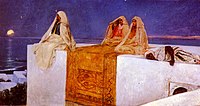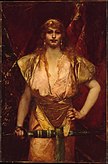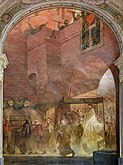Jean-Joseph Benjamin-Constant
Jean-Joseph Benjamin-Constant | |
|---|---|
 Jean-Joseph Benjamin-Constant, ca. 1890 | |
| Born | Jean-Joseph Constant 10 June 1845 Paris, France |
| Died | 26 May 1902 (aged 56) Paris, France |
| Known for | Painting, etching |
| Movement | Orientalist |
Jean-Joseph Benjamin-Constant (also known as Benjamin-Constant), born Jean-Joseph Constant (10 June 1845 – 26 May 1902), was a French painter and etcher best known for his Oriental subjects and portraits.
Biography
[edit]


Benjamin-Constant was born in Paris. He studied at the Ecole des Beaux-Arts in Toulouse, where he was a pupil of Alexandre Cabanel. A journey to Morocco in 1872 strongly influenced his early artistic development and lead him to produce Romantic scenes under the spell of Orientalism. Among his noted works in this vein are Last Rebels, Justice in the Harem (both in the Luxembourg Gallery), Les Chérifas, and Moroccan Prisoners (Bordeaux). His large canvas, The Entrance of Mahomet II into Constantinople (Musée des Augustins Toulouse), received a medal in 1876.
After 1880, he changed his manner, devoting himself to mural decorations and to portraits. Prominent examples include the great plafond in the Hôtel de Ville, Paris, entitled Paris Convening the World; his paintings in the New Sorbonne, representing Literature, The Sciences, and the Academy of Paris; and the plafond of the Opéra Comique theatre. He was distinguished as a portrait painter, especially in England, where he was a favorite of the aristocracy. His portrait Mons fils André (Luxembourg) was awarded a medal of honor at the Salon in 1896.
Benjamin-Constant painted Pope Leo XIII, Queen Alexandra of the United Kingdom (1901), Lord John Lumley-Savile, and Henri Blowitz (1902). He was made a member of the institute in 1893, and was a commander of the Legion of Honor. He visited the United States several times, and painted a number of portraits. The Metropolitan Museum of Art in New York exhibited a large painting by Benjamin-Constant entitled Justinian in Council. The painting was returned by the Metropolitan to the owners family in 1928. It was purchased by John Ringling in 1929 and is currently on exhibit in the Ringling Museum in Sarasota
Benjamin-Constant also taught at Académie Julian;[1] among his pupils were the miniaturists Alice Beckington[2] and Angele L'hermerout and the Scottish artist W. S. Shanks.[3] He was a writer of repute, contributing a number of studies on contemporary French painters. Along with fellow artists, Nasreddine Dinet, Paul Leroy, Jean-Léon Gérôme and curator/ art historian, Léonce Bénédite, he was one of the founders of the Société des Peintres Orientalistes Français.[4]
He died in Paris on 26 May 1902.
Gallery
[edit]-
Arabes assis (1877)
Dahesh Museum of Art -
Les nuits arabes
Private collection -
La favorite d'émir (1879)
National Gallery of Art, Washington, D.C.
-
Marchand de tapis à Tanger (1883)
Private collection -
The Throne Room In Byzantium
Private collection -
Entrée de Mehmed II dans Constantinople (1876)
Musée des Augustins Toulouse -
Entrée du Pape Urbain à Toulouse
Capitole de Toulouse
See also
[edit]- The Day of the Funeral - Scene from Morocco
- List of Orientalist artists
- Orientalism
- Société des Peintres Orientalistes Français
Publications
[edit]- Stranahan, Clara Harrison (1879). A History of French Painting. New York City, New York.
{{cite book}}: CS1 maint: location missing publisher (link) - Strahan, Edward (1977). The Art Treasures of America. Vol. III. Philadelphia, Pennsylvania. p. 60.
{{cite book}}: CS1 maint: location missing publisher (link)
References
[edit]- ^ "Jean-Joseph Benjamin-Constant". The Rockwell Center for American Visual Studies. 13 February 2019. Retrieved 23 February 2021.
- ^ Metropolitan Museum of Art (New York, N.Y.); Carrie Rebora Barratt; Lori Zabar (1 January 2010). American Portrait Miniatures in the Metropolitan Museum of Art. Metropolitan Museum of Art. pp. 244–. ISBN 978-1-58839-357-9.
- ^ Sale of Tiddley Winks by William Somerville Shanks, R.S.A., R.S.W - Sotheby's (2008)
- ^ Benjamin, R., Orientalist Aesthetics: Art, Colonialism, and French North Africa, 1880-1930, University of California Press, 2003, p.57
 This article incorporates text from a publication now in the public domain: Gilman, D. C.; Peck, H. T.; Colby, F. M., eds. (1905). "Jean-Joseph Benjamin-Constant". New International Encyclopedia (1st ed.). New York: Dodd, Mead.
This article incorporates text from a publication now in the public domain: Gilman, D. C.; Peck, H. T.; Colby, F. M., eds. (1905). "Jean-Joseph Benjamin-Constant". New International Encyclopedia (1st ed.). New York: Dodd, Mead.
External links
[edit]- 1845 births
- 1902 deaths
- 19th-century French painters
- 20th-century French painters
- 19th-century French male artists
- 20th-century French male artists
- Academic art
- Commanders of the Legion of Honour
- French male non-fiction writers
- French male painters
- French biographers
- Academic staff of the Académie Julian
- Members of the Académie des beaux-arts
- French Orientalist painters










